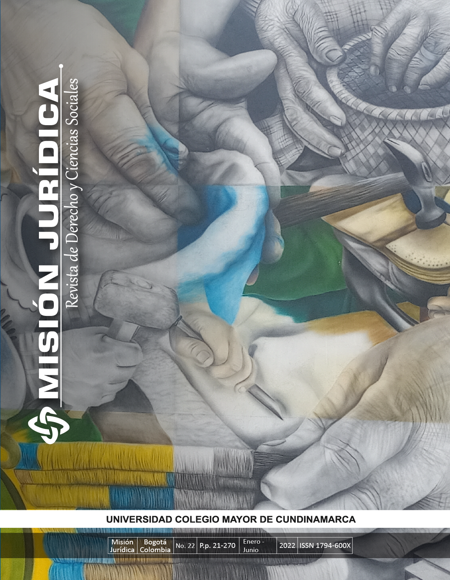COPYRIGHT PROVISIONS
Every papper included in the magazine can be reproduced whole or in part, provided that respect for its original content, the source is acknowledged and is used with non-commercial academic. Legal mission and its content is protected under a license Creative Commons Attribution-Noncommercial-

Misión Jurídica is distributed under a Creative Commons Attribution-NonCommercial-NoDerivar 4.0 International License.
Based on a work in http://unicolmayor.edu.co/publicaciones/index.php/mjuridica/index.
Permits that go beyond what is covered by this license can be found at http://unicolmayor.edu.co/publicaciones/index.php/mjuridica/index.
Show authors biography
This research focuses on the foundations of administrative law in a social and democratic State, in which human dignity is presented as the core and root of the legal system, provoking a Copernican turn in the current comprehension of this Branch of public law, still dominated by vertical positions, anchored in a static idea of privilege and the prerogative of the public powers.
The scope is limited to the foundation of administrative law and to its main institutions, at the times in which the health emergency puts into consideration the solidity and vitality of a State model that is flooding because its pillars and bases were not as solidly established as it was thought. For this purpose, the main institutions of Administrative Law are reviewed in the light of the impact the pandemic has on their important marks of identity.
The main results show the necessity of a radical change in the understanding of the foundations of administrative law and the convienience of introducing human development indicators in the design of the administrative institutions that support and compose public policies. The conclusions are, on one hand, the decline of administrative law built on exorbitant clauses and, on the other hand, the arrival of a more humanistic vision that, driven by democratic understanding of the general interest, provides greater social sensitivity to administrative law as a whole.
Article visits 193 | PDF visits 145
Downloads
- Balbín, C. (24 de mayo, 2014). Un Derecho Administrativo para la inclusión social. Revista de Direito Administrativo & Constitucional 14 (58), 33-59.
- Bidart Campos, G. J. (1997). La responsabilidad en los Tratados de jerarquía constitucional. En Responsabilidad por daños en el Tercer Milenio. Homenaje al profesor doctor Atilio Aníbal Alterini, J. A. Bueres y A. Kemelmajer de Carlucci (Directores),425-432. España: Abeledo-Perrot.
- Meilán G., J. L. (1967). El proceso de la definición del Derecho Administrativo. Madrid: Escuela Nacional de Administración Pública.
- Rodríguez-Arana, J. (2013). Interés general, Derecho Administrativo y Estado de bienestar.
- Pérez H., A. (2009). El sistema de derechos humanos y el servicio universal como técnica para una respuesta global. En A. Embid Irujo (Director). Derechos Económicos y sociales (pp. 93-94).
- Wunder H., D. (2014). Tutela administrative efetiva dos direitos fundamentais sociais: por un implementacao espontánea, integral e igualitaria. [Tesis Doctoral, Universidad Federal de Paraná].















